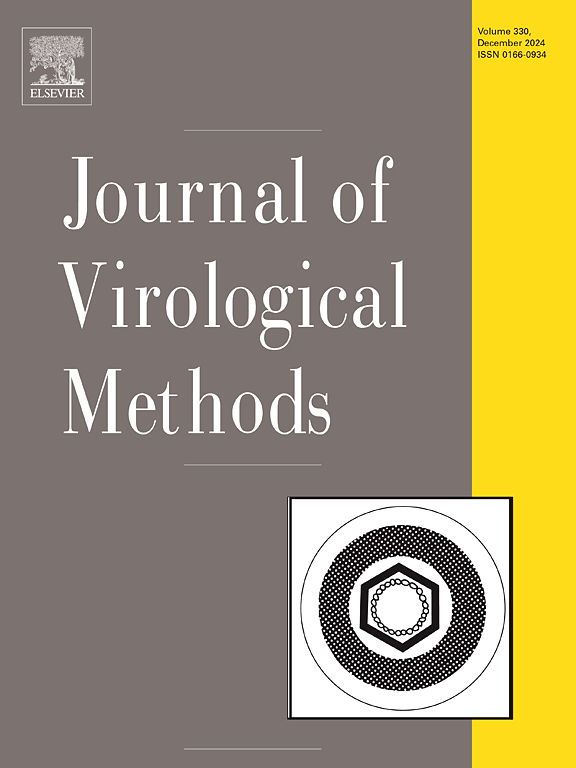Optimization of an infectious subgenomic amplicons reverse genetics protocol for the rescue of synthetic coronaviruses
IF 1.6
4区 医学
Q3 BIOCHEMICAL RESEARCH METHODS
引用次数: 0
Abstract
Reverse genetics (rg) systems are indispensable tools for investigating the pathogenesis of RNA viruses, facilitating vaccine design, and advancing antiviral therapeutic strategies. In this study, we optimized the Infectious Subgenomic Amplicons (ISA) method for generating synthetic r-wt SARS-CoV-2 Wuhan-Hu-1. This system was validated by demonstrating the successful rescue of infectious viral particles from overlapping DNA fragments and their propagation in vitro. Sequencing confirmed 100 % identity of the recovered virus with the Wuhan-Hu-1 reference genome. Importantly, in vivo experiments using K18-hACE2 mice revealed that the r-wt SARS-CoV-2 Wuhan-Hu-1 strain caused clinical symptoms, weight loss, and mortality comparable to those induced by a virulent SARS-CoV-2 field variant. This ISA rg method offers a rapid and reproducible approach to generating synthetic coronaviruses, with potential applications in pathogenesis studies, antiviral testing, and vaccine development.
用于拯救合成冠状病毒的传染性亚基因组扩增子反向遗传学方案的优化。
反向遗传学(rg)系统是研究RNA病毒发病机制、促进疫苗设计和推进抗病毒治疗策略不可或缺的工具。在本研究中,我们优化了感染亚基因组扩增子(ISA)方法,用于合成r-wt SARS-CoV-2武汉- hu -1。该系统成功地从重叠的DNA片段中拯救了感染性病毒颗粒,并在体外进行了繁殖。测序证实恢复的病毒与武汉-沪-1参考基因组100%一致。重要的是,使用K18-hACE2小鼠进行的体内实验显示,r-wt SARS-CoV-2武汉- hu -1毒株引起的临床症状、体重减轻和死亡率与SARS-CoV-2毒株引起的死亡率相当。这种方法为合成冠状病毒提供了一种快速、可重复的方法,在发病机制研究、抗病毒测试和疫苗开发方面具有潜在的应用前景。
本文章由计算机程序翻译,如有差异,请以英文原文为准。
求助全文
约1分钟内获得全文
求助全文
来源期刊
CiteScore
5.80
自引率
0.00%
发文量
209
审稿时长
41 days
期刊介绍:
The Journal of Virological Methods focuses on original, high quality research papers that describe novel and comprehensively tested methods which enhance human, animal, plant, bacterial or environmental virology and prions research and discovery.
The methods may include, but not limited to, the study of:
Viral components and morphology-
Virus isolation, propagation and development of viral vectors-
Viral pathogenesis, oncogenesis, vaccines and antivirals-
Virus replication, host-pathogen interactions and responses-
Virus transmission, prevention, control and treatment-
Viral metagenomics and virome-
Virus ecology, adaption and evolution-
Applied virology such as nanotechnology-
Viral diagnosis with novelty and comprehensive evaluation.
We seek articles, systematic reviews, meta-analyses and laboratory protocols that include comprehensive technical details with statistical confirmations that provide validations against current best practice, international standards or quality assurance programs and which advance knowledge in virology leading to improved medical, veterinary or agricultural practices and management.

 求助内容:
求助内容: 应助结果提醒方式:
应助结果提醒方式:


